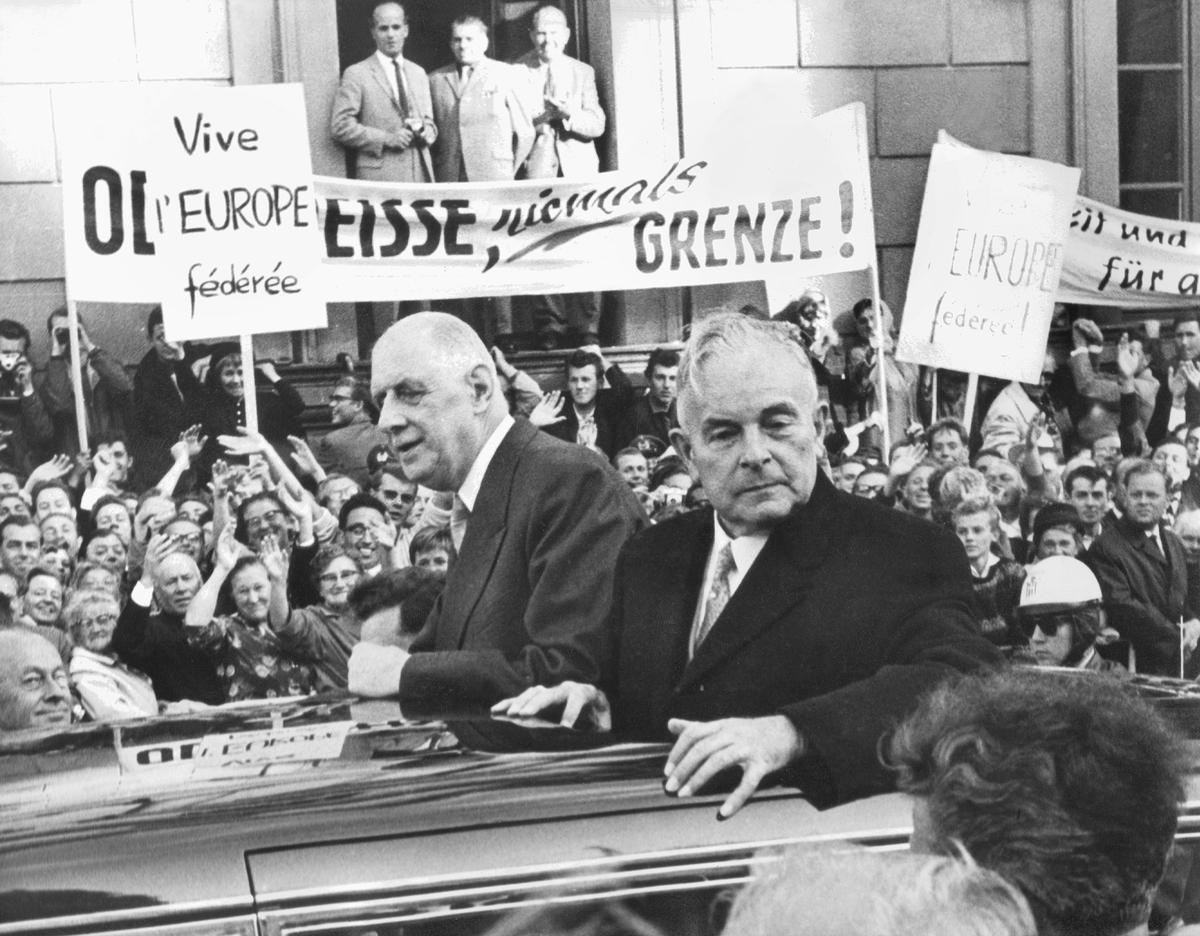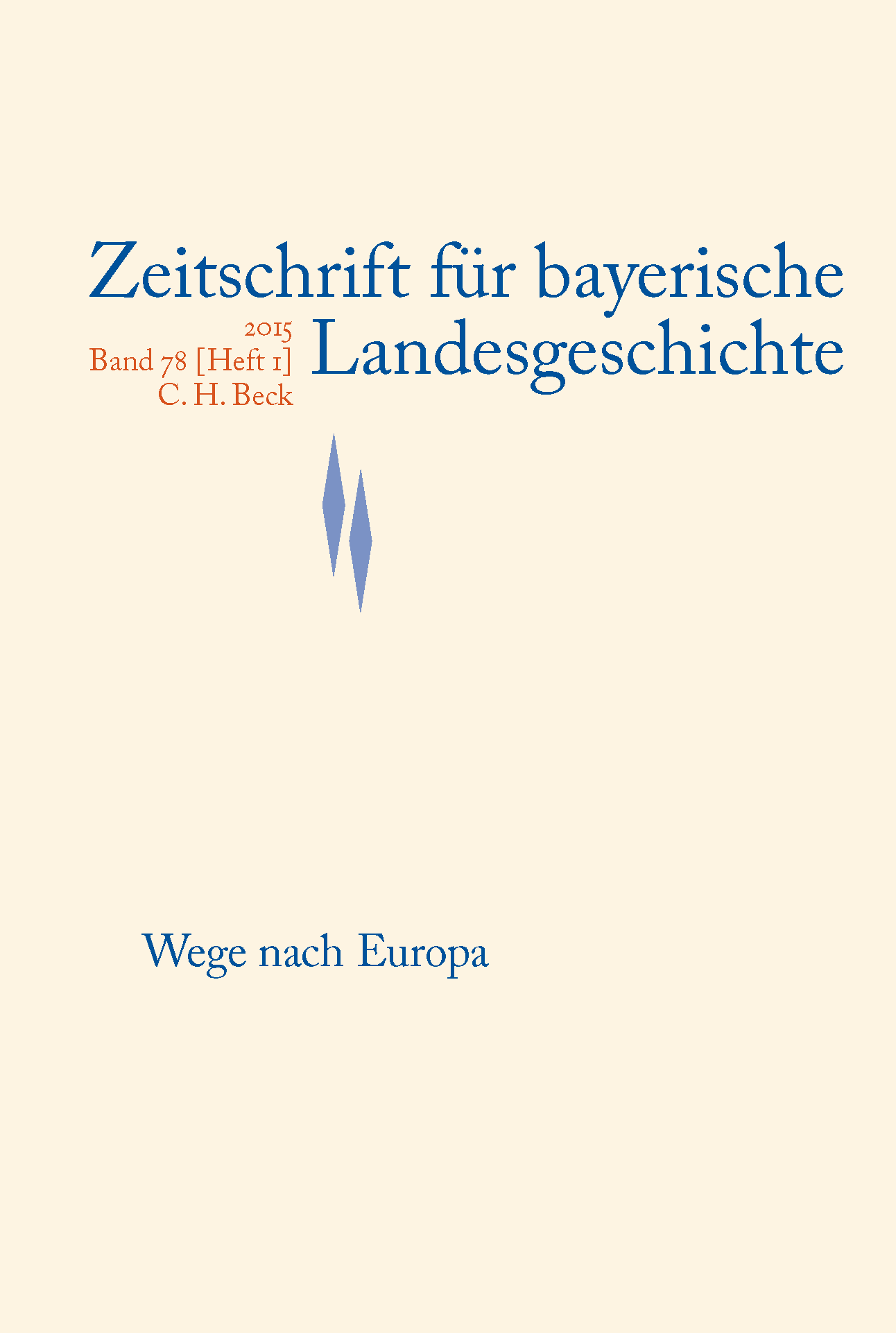Even if Bavaria’s central location between European powers has provided fertile grounds for thinking and acting on a European level throughout its history, it cannot be denied that Europe took on a new significance in Bavarian politics and civil society after 1945. The notion that the future of Bavaria and Germany was as “European states” in the “United States of Europe” began to gain traction. Bavaria increasingly sought to distance itself from nationalism and the tradition of German-national and national-liberal political thought and to draw on the state’s long history of exchange with Romance-language culture.1 Unified Europe2 became a dominant idea in political discourse, and the realization of European unification in the European Communities and later the European Union created a new forum for Bavarian politics3 and civil society.4 Federalism5 was seen as the organizing principle that would enable Bavaria to maintain its relative political and cultural autonomy within the Federal Republic of Germany and the Europe of the future.6 Indeed, this conception of federalism was complex: it was embedded within Western Christian and humanist traditions7 and clearly set itself apart from Soviet Communism; but, it was also heavily influenced by a view of Bavarian history that centered on Bavarian statehood8 and by Bavaria’s long-standing reliance on the Catholic principle of subsidiarity. At the same time, Bavaria wanted to make a contribution to a renewed, united Europe that would rest on principles of individual freedom, rule of law and democracy and aim to promote international understanding and respect for the diversity of its member nations and regions while ensuring for peace and prosperity as well as trade standards and social rights.9 Many Bavarians have identified with these goals. They have travelled the “Road to Europe”10 at the state, national, and European level by taking trips, learning foreign languages, joining in on Europe-themed events, meeting people from different countries, participating in student exchange programs, volunteering in civil society organizations and sister city programs, becoming engaged in politics, church life, and the local community, working in trade, science, education, media, and the cultural sphere, and organizing cultural events. In doing so, they have created new social relations, practices, and a singularly European discourse.11
Regional historians have as yet paid little attention to the European dimensions of society, culture, economics and politics in contemporary Bavarian history,12 despite the fact that they have done considerable research on Bavaria’s relation to Europe in previous epochs13 and documented the increasing influence of Europe on Bavaria since the 1957 Treaty of Rome. Individuals and the economy have benefited from the new rights and possibilities afforded by a unified Europe, but this has also cost states and nations some of their old authority.14 Moreover, Bavaria has developed political initiatives to foster the idea of Europe both inside and outside of its own borders, becoming itself a player in the process of European unification. To name just a few examples: In September 1948, after Bavarian representatives Friedrich von Prittwitz und Gaffron (CSU) and Waldemar von Knoeringen (SPD) had returned from participating in the Congress of the European Parliamentary Union in Interlaken, Switzerland,15 Bavarian Landtag representatives of all political parties passed a resolution demanding that the Bavarian government do everything in its power to promote the idea of a United States of Europe and support its practical implementation.16 In 1946, the first party platform of the new CSU supported a European confederation and a European trade and currency union.17 Later, Bavaria helped develop the concept of a “Europe of Regions”18 and played an important role in making the subsidiarity principle part of the Treaty of Maastricht.19 Heinrich Aigner, a member of the European Parliament from Amberg, also worked tirelessly to establish the European Court of Auditors.20 Finally, Bavaria was instrumental in the passage of the so-called Europe Article (Article 23) of the German constitution in 1992,21 which lays out the obligations of the German states in matters concerning the European Union, and it modified its own constitution in light of the developments at the European level by adopting Article 3a.22 As the Euro was being introduced, two high-ranking Bavarian CSU politicians – Federal Minister of Finance Theo Waigel, who was immediately responsible for the Euro’s implementation, and, as a critic of the Euro project, Bavarian Minister President Edmund Stoiber – played opposing yet important roles that extended well beyond Bavarian borders.23 By providing a nuanced perspective on the role of states, communes and municipalities in the multi-level European system and on the processes that intertwine the various levels of state on the one hand and civil society on the other,24 regional history promises to give us a better understanding of both the changes that Bavaria underwent in the second half of the twentieth century and the more general, multi-faceted and by no means linear process of Europeanization.25
Since 2014, the Institute for Bavarian History at the Ludwig Maximilian University Munich has been working on a project called “Roads to Europe.” The project aims to analyze discourses of European unification, the steps taken to make it reality, and the various forms of criticism and resistance directed against it. Moreover, it seeks to study the changes in regional politics brought about by European unification and the effects that Europeanization has had on the lives of people living in Bavaria.26 Raphael Gerhardt is doing research on agricultural policy, which was delegated to the authority of the European Economic Community – and, later, the European Union – to a high degree at a very early stage; as the Bavarian economy was traditionally heavily reliant on agriculture, Bavaria had to undertake a number of measures to conform to the new supranational rules and regulations.27 Rudolf Himpsl is studying the history of Bavaria’s international trade relations, which were increasingly shaped by the EEC after the Treaty of Rome was signed. His research suggests that considerable reservations surfaced over the fact that only six states were part of the EEC.28 Thomas Jehle is doing work on Bavaria’s interstate and international cultural policies, which sought to support both Bavaria’s autonomy as well as Germany’s reintegration into Europe and the international community.29 Claudia Schemmer is seeking to understand the effects that Europeanization and internationalization have had on rural Bavaria by conducting a case study on the Traunstein region. More generally, her work aims to provide insights into the ways municipalities and civil society have influenced one another in their efforts to support the European idea.30 Laura Ulrich is conducting research on politicians who have entered European politics in order to support the project of European unification as well as to promote Bavarian interests and perspectives.31 Finally, Alexander Wegmaier is analyzing Bavaria’s policies towards Europe, the various conceptions of and discourses on European politics represented and promoted by political parties, unions and civil society initiatives, and the ways these groups have sought to achieve their agendas.32 The articles collected here thus shed light on just a few aspects of the multi-faceted research sponsored by the project “Roads to Europe.”


